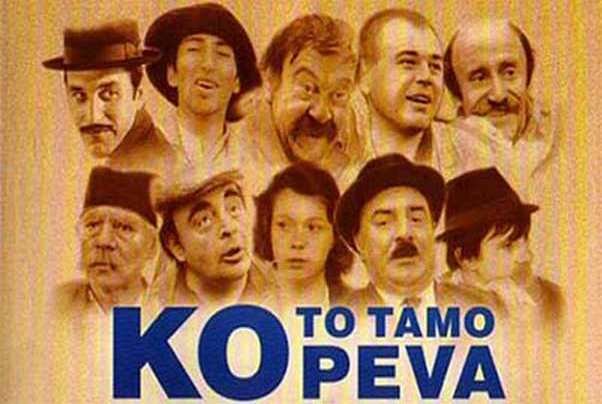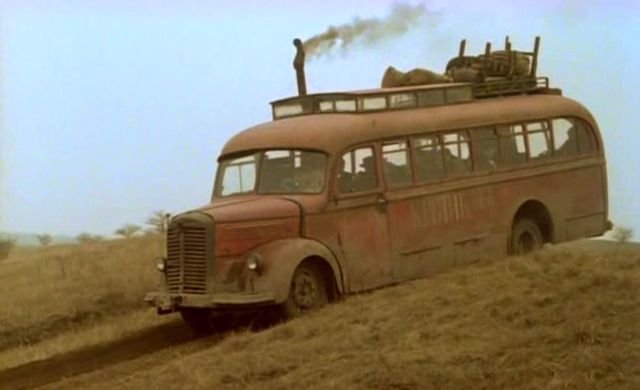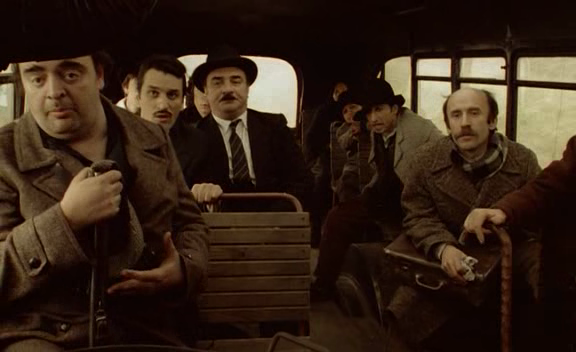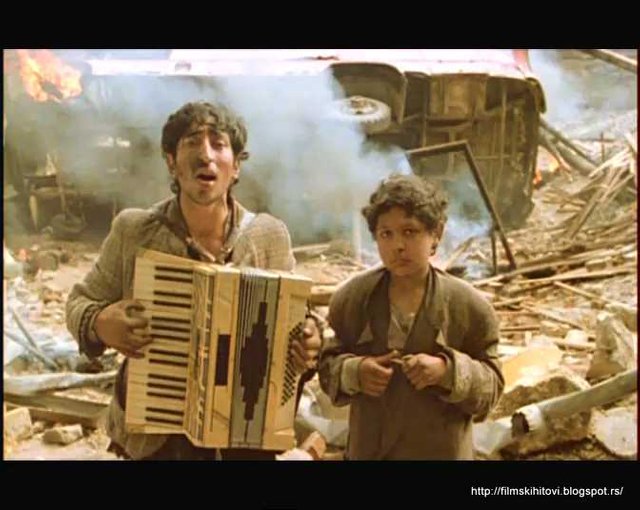MOVIE REVIEW: „WHO’S SINGIN’ OVER THERE“ – one of the most brilliant Serbian movies of all time
The Serbian cinematography became a lot richer when an incredible based-on-true-story dark comedy „Who’s singin’ over there“ (in Serbian - „Ko to tamo peva“) aired back in 1980. The cast included some of the best and most popular actors and actresses of ex-Yugoslavia. The movie got excellent reviews and the proof of its quality is the fact that it is still watched and loved among the audience - almost 40 years after its premiere. It got a lot of prestige awards, including Grand Prix in Montreal, Panama, Salamanca and Rotterdam and Audience Award in Cannes Film Festival. What’s the most interesting is that it’s actually low budget film with a very simple plot, with no special effects and no complicated scenography. The entire movie is filmed in Deliblato Sands, a place near my hometown. J Although it’s a comedy on the outer level, in a deeper sense, it reveals many details that indicate the Serbian society's structure and atmosphere at the time. It is the perfect image of society and their biggest prejudices and flaws.

The movie plot is set on April 5, 1941 – the day before German bombing of Yugoslavia. It starts with two young male Gypsy musicians playing harmonica and Jew’s harp in the place that looks almost like a desert and singing: I'm miserable, I was born that way, I sing to sing my pain away... dear Mama, I wish this was just a dream. At the end of the performance, they join other passengers who are traveling to Belgrade in the improvised bus station. The passengers include an old man who suffers from tuberculosis, a cranky war veteran, clumsy and overweight hunter, Germanophile and a young man who hopes to become a singer but has no talent at all. They are waiting for the bus from „Krstic and son“ company which is late. At some point, a hunter decides to walk towards the next station and wait for the bus there. When the bus finally comes, Gypsies also get on which leads to dissatisfaction and complaining of others. Through the whole movie, they fear of getting robbed and openly warn each other in front of them.

The owner and conductor of the bus is a hypocrite man who overly respects the law in some ridiculous situations, but at the same time breaks it if it’s in his favor. The perfect example is the fact that he can stop the bus wherever he wants (even at some farm out of the station to buy two little pigs), but can’t allow a hunter to get on „because it’s not a station“ and „somebody could see and report him“, even though there is no one passing by. So, he has to run all the way to the next station in order to catch them. The driver is owner’s son Misko, who seems to be a bit mentally-retarded, but kindhearted. At the next station, the young newlywed get on the bus along with breathless hunter. The couple keeps kissing and touching which annoys the other passengers, especially the Germanophile. He even starts wondering if they’re really married, which makes the conductor ask for their marriage certificate. When they show it, he says that „everything is according to regulations“, but warns them to ,,keep hands from each other while they’re on the bus“. I think that scene shows people’s fake moral, habit of criticizing and meddling when it’s none of their business.
The bride becomes an object of the singer’s attention and he keeps hitting on her mostly by singing romantic ballads. The groom is obsessed with only two things: his constant eating and the lust for his bride. He seems dullish and unaware of everything going on around him, even the singer’s effort to seduce his bride. She, on the other hand, wants nothing more than to see the world, or at least to see Belgrade and the sea. Eventually, she gets interested in the singer, who promises to take her everywhere she wants.
The cheerful and excited Misko is constantly wiggling and turning around to his father, desperate for his praises of his ability to drive. This makes the singer worried about their safety so he reminds him to look ahead while driving. That bothers his father, who tells a story how he once drove almost two kilometers with a blindfold. Everybody starts to laugh and yell how it must be a lie, which pisses him even more, so he grabs a black scarf and ties it over Misko’s eyes. The stunned passengers hold tight their seats while begging him not to do it. But, he gets even more excited and starts driving all the way until the moment he almost hits a lamppost.

They continue their ride to Belgrade, but somewhere along the way, they encounter a few soldiers who explain the road is closed and order them to turn around and detour. After just a few miles, they run into manikin who owns the field they would have to cross in order to go on with their ride, but he forbids them to continue. The conductor gets out of the bus to try to convince him to let them go. He refuses and calls his children who happen to be four extremely tall, strong men. The conductor gets scared and hides behind the bus thinking they are going to beat him. Instead, they start drilling the tires, which seems to be even worse for him, so he decides to negotiate. The manikin agrees to let them go, but only if they pay one hundred dinars. The conductor then gets back on the bus and tells the passengers that manikin wants two hundred dinars. They begin to complain and curse, but however, give the money, because they all must get to Belgrade.
After a few minutes, a random funeral passes by and they decide to join it until the conductor replaces the tires. During the funeral, Misko starts crying like a baby even though the deceased is unknown to all of them. This proves how good-hearted and sensitive he is. At the same time, the newlyweds sneak up to some nearby forest to make love. This is probably one of the most memorable and comic scenes of the entire movie because the rest of the passengers secretly hides to watch. When they become aware they’re not alone, they hurry to put some clothes on. The Germanophile judges them and shouts how they should be ashamed of themselves, when it’s actually he and the rest of the „watchers“ who are supposed to be.
After a while, they come to the old, wooden bridge that is being fixed by the farmers. They all get out of the bus and begin to outwit whether or not they should cross the bridge, even though farmers clearly say it’s too dangerous. Germanophile steps on the bridge to calculate something and comes to the conclusion it’s safe enough to cross it. He grabs bridge’s fence, but suddenly it breaks and he falls off the bridge. Seeing that, everybody starts to panic and runs off the bridge. What shocked me the most about this scene is how they all got back on the bus like nothing happened and not single one of them tried to find and save him.

After 50 kilometers the conductor decides it’s time to take a break at the river cost. He gets food out of the bus and pays Gypsies to play and entertain the passengers. Some of them dance, some of them eat, but all of them are caught by surprise when Germanophile suddenly shows up getting out of the river. They give him clean clothes and prepare to go on when the army appears out of nowhere. Misko is being recruited which makes his father sad and proud at the same time. Night falls and they all gather around the campfire to sleep.
The next morning, they continue without Misko and the hunter who is kicked out by the conductor when his rifle accidentally fires and almost kills them, even though he desperately keeps apologizing. He finds a wallet in the grass just as the bus leaves and realizes some of the passengers must have dropped it. He runs towards the bus and yells them to stop, but they don’t hear. This shows that he is an honest, good man. In the bus, conductor starts talking to a war veteran who is going to Belgrade to see his son. He wants to show him a picture, but when he reaches a pocket to get a wallet, it’s not there. He shouts his wallet is gone and assumes somebody took it. The Germanophile says that „they all know who the thieves among them are“, looking at Gypsies. They all jump, start to punch through their pockets and hit them. The fight breaks the sound of the airplanes. They all stand still and looks up. The sound of the planes is getting louder and louder and suddenly a bomb hits the bus. A smoke fills the screen. For a few seconds, nothing but the ruined bus is shown. And then, someone starts to get out. It’s the Gypsies! They are slowly approaching the screen and singing a new song...

I believe that the last scene has truly deep and important meaning. The only people who survive in the movie are the hunter, Misko and the Gypsies. I think it’s the sign of God’s justice because they are not greedy and full of prejudices like everybody else.
There is another character in this movie who doesn’t seem to have any role, but, there has been a lot of controversy surrounding it through the years. It’s an old woman dressed all in black who sits in the back seat of the bus. According to the critics, she is supposed to be a symbol of death.
I really hope you like it and maybe decide to watch it someday.
If you like my post, please upvote, comment and follow!
Great post! Keep doing it!
Thanks :)